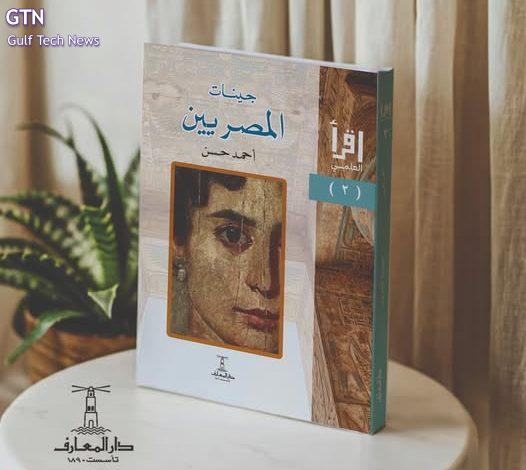Communications & TechnologyConference & Eventslocal newsNews
Egyptians’ Genes Wins Best Scientific Book Award at the 56th Cairo International Book Fair

The book *”Egyptians’ Genes”* by author Ahmed Hassan, published by Dar Al-Maaref under the leadership of Engineer Rizk Abdel-Sami Ahmed, has won the Best Scientific Book Award at the 56th Cairo International Book Fair. The announcement was made earlier today, Wednesday, during the fair’s closing ceremony.
The book is part of Dar Al-Maaref’s newly launched series *Iqra’ Al-Ilmi* (Read Scientific), an initiative introduced by writer and critic Ehab Al-Mallah, who oversees publishing and content at Dar Al-Maaref. The editorial management of the series has been entrusted to young doctor and translator Ahmed Samir Saeed. So far, four books have been published in the series, receiving significant acclaim from book fair attendees and enthusiasts of scientific culture and awareness.
In his introduction to the series, Ahmed Samir Saeed highlighted its historical roots: “Over eighty years ago, in 1943, the first edition of the *Iqra’* series was published. Since then, it has enriched the Egyptian and Arab cultural landscape with seminal works across various fields, penned by distinguished authors whose names are etched in the annals of literary history. It is no surprise that Dar Al-Maaref has harnessed this rich legacy to create a specialized series dedicated to simplifying science and promoting scientific culture in the 21st century. We hope that *Iqra’ Al-Ilmi* will continue to fulfill this vital role, just as its parent series has done.”
The first book in the new series, *”The Machine Delusion — The Story of Artificial Intelligence”* by engineer Mostafa Al-Adawi, was published in October. In December 2024, *”Egyptians’ Genes”* by Ahmed Hassan Belah, a renowned scientific culture researcher and editor in scientific journals, was released. This groundbreaking work is the first comprehensive Arabic-language book to shed light on the critical topic of the “Egyptian Reference Genome Project,” a monumental initiative that holds significant importance for the Egyptian government. The book presents this complex subject in a simple, accessible language for Egyptian and Arab readers.
In his preface, Hassan writes, *“*Egyptians’ Genes* comes at a time when the results of the scientific revolution in biology, which began in the mid-20th century, are becoming evident. We are entering a new era where disease diagnosis and personalized treatment are based on an individual’s genetic makeup. This shift requires in-depth knowledge of the Egyptian genome and related diseases to provide effective preventive, diagnostic, and counseling services for prevalent genetic disorders in Egypt. Therefore, Egypt has launched the ‘Egyptian Reference Genome Project,’ which carries great promises while facing numerous medical, cultural, legal, and religious challenges.”*
The book highlights the project’s objectives, including sequencing the genomes of 100,000 healthy Egyptian adults, approximately 8,000 individuals with potential genetic disorders, and 200 ancient Egyptian mummies. It also aims to establish the first comprehensive genomic database in Egypt and North Africa. Moreover, the book explores the genetic origins of Egyptians, debunking unscientific claims, and examines, through expert insights and recent research, the development of genetic diseases among ancient Egyptians. It emphasizes the importance of understanding their health conditions, providing invaluable scientific insights that enhance our comprehension of ancient Egyptian civilization.
The book is part of Dar Al-Maaref’s newly launched series *Iqra’ Al-Ilmi* (Read Scientific), an initiative introduced by writer and critic Ehab Al-Mallah, who oversees publishing and content at Dar Al-Maaref. The editorial management of the series has been entrusted to young doctor and translator Ahmed Samir Saeed. So far, four books have been published in the series, receiving significant acclaim from book fair attendees and enthusiasts of scientific culture and awareness.
In his introduction to the series, Ahmed Samir Saeed highlighted its historical roots: “Over eighty years ago, in 1943, the first edition of the *Iqra’* series was published. Since then, it has enriched the Egyptian and Arab cultural landscape with seminal works across various fields, penned by distinguished authors whose names are etched in the annals of literary history. It is no surprise that Dar Al-Maaref has harnessed this rich legacy to create a specialized series dedicated to simplifying science and promoting scientific culture in the 21st century. We hope that *Iqra’ Al-Ilmi* will continue to fulfill this vital role, just as its parent series has done.”
The first book in the new series, *”The Machine Delusion — The Story of Artificial Intelligence”* by engineer Mostafa Al-Adawi, was published in October. In December 2024, *”Egyptians’ Genes”* by Ahmed Hassan Belah, a renowned scientific culture researcher and editor in scientific journals, was released. This groundbreaking work is the first comprehensive Arabic-language book to shed light on the critical topic of the “Egyptian Reference Genome Project,” a monumental initiative that holds significant importance for the Egyptian government. The book presents this complex subject in a simple, accessible language for Egyptian and Arab readers.
In his preface, Hassan writes, *“*Egyptians’ Genes* comes at a time when the results of the scientific revolution in biology, which began in the mid-20th century, are becoming evident. We are entering a new era where disease diagnosis and personalized treatment are based on an individual’s genetic makeup. This shift requires in-depth knowledge of the Egyptian genome and related diseases to provide effective preventive, diagnostic, and counseling services for prevalent genetic disorders in Egypt. Therefore, Egypt has launched the ‘Egyptian Reference Genome Project,’ which carries great promises while facing numerous medical, cultural, legal, and religious challenges.”*
The book highlights the project’s objectives, including sequencing the genomes of 100,000 healthy Egyptian adults, approximately 8,000 individuals with potential genetic disorders, and 200 ancient Egyptian mummies. It also aims to establish the first comprehensive genomic database in Egypt and North Africa. Moreover, the book explores the genetic origins of Egyptians, debunking unscientific claims, and examines, through expert insights and recent research, the development of genetic diseases among ancient Egyptians. It emphasizes the importance of understanding their health conditions, providing invaluable scientific insights that enhance our comprehension of ancient Egyptian civilization.





